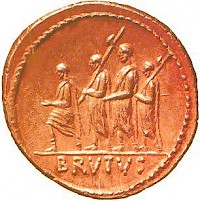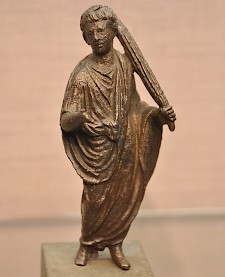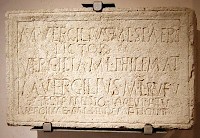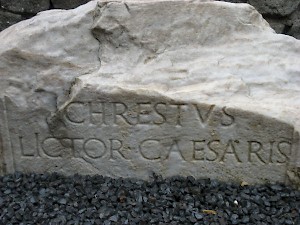Lictor
Lictor: bodyguard in ancient Rome, whose task it was to protect magistrates.

The word lictor may be derived from the Latin verb ligare, which means "to bind". This is sometimes said to refer to the fasces they carried, which were a set of rods that were bound in the form of a bundle, and contained an ax. In other words, the lictor was the man who prepared the fasces, the "binder", or had to - according to other sources - bind the hands of criminals. An alternative for these unconvincing etymologies is that the word is derived from the Etruscan root lauchum, which means "royal". There is something to be said for this, because the lictors had once been the bodyguard of the Etruscan and Roman kings, and the fasces are probably an Etruscan invention.
According to the Roman tradition, in the archaic age, each of the kings of the twelve-city league of Etruria had twelve lictors. Unfortunately, we have no proof that there were ever twelve member towns of this league. Given the plurality of constitutions in the better known fifth and fourth centuries, it is highly unlikely that there were ever twelve Etruscan kings. The tradition seems to be invented to explain why the Roman kings had twelve lictors.

After the fall of the Roman monarchy, the lictor and his fasces were the symbols of those magistrates that held imperium, which means that they had the right to command and interpret the flight of the birds. A consul was escorted by twelve lictors and a praetor by six. On special occasions, this number varied. For example, the arch of Titus shows a triumphator with thirteen lictors; it seems that the additional guard was there to give added luster to the occasion. Likewise, when a dictator was appointed during a crisis, he had an escort of twenty-four lictors to show that he was more powerful than both consuls. The other magistrates -quaestor, aedile, censor- held no imperium and were not escorted by a bodyguard.
Other persons entitled to a lictor were the Vestal Virgins (although this was technical not an ordinary lictor, but a lictor curiatus), and the governors of the provinces (proconsuls and propraetors), who had six bodyguards. The commanders of the legions were surrounded by five lictors, indicating that they were subordinate to the governors. Finally, in Egypt, the sacred bull Apis was protected by a lictor.

Lictors had several tasks. In the first place, they had to stand next to the magistrate when he addressed the crowd. This explains why the speaker's platform on the Roman Forum (Rostra) is so large: not only the consul had to stand over there, but his entire escort as well. When the magistrate left the Forum, or arrived, the lictors had to make room. This also implied minor jobs like opening gates and knocking on doors. The lictor was also responsible for the safety of the magistrate when he was at home. We read about visits to temples, theaters and even baths.
Lictors were also responsible for arresting and punishing people. This was the function implied in the fasces: the rods could be used to lash people, the ax to execute them. Probably, this last task had already become a dead letter by the middle of the fifth century. After the Laws of the twelve tables, no Roman magistrate could summarily execute a Roman citizen.
A magistrate was never seen without his lictors, except for two occasions: when he entered a free city, and when he visited a higher magistrate. So, when a praetor visited a consul, the lictors remained outside.

A special group of lictors was that of the thirty lictores curiati. They had religious tasks, and served the pontifex maximus (high priest) and the priests known as flamines They had tasks when a sacrifice was brought, represented the assembly of the tribes (comitia curiata), and were responsible for the protection of the Vestal Virgins. After the fall of the republic, they also protected female members of the imperial family.
Not everybody could become lictor. One had to be strong and had to be a free man - something that was shown by the fact that in the city, the lictor wore a toga. This cannot have been practical if the lictor had to protect his magistrate with violence, and it comes as no surprise that he wore a cape when he was in a military camp. In return for his services a lictor received a salary of 600 sesterces (at the beginning of our era), which was two-thirds of the earnings of a legionary. It was a decent income.